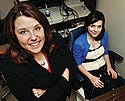October 1, 2009
R&D DIGEST
|
Purdue associate professor Jessica Huber (left) and graduate student Meghan Moran work with technology that could help patients with Parkinson's disease speak at a more audible level. (Photo courtesy of Purdue University/Andrew Hancock) |
By filling a patient's ear with background “babble,” researchers are developing technology that forces soft-spoken patients to raise their voices. More specifically, the technology is designed for people suffering from Parkinson's disease who tend to speak at lower volumes.
Developed at Purdue University (West Lafayette, IN), the system consists of a voice-activated device and sensor. The voice-detection component is an accelerometer that is placed on the patient's neck. Once the person speaks, the sensor communicates to the device, which then plays background noise through an earpiece. The ambient sound played into the ear is similar to the noise generated by a restaurant full of people.
The background noise causes patients to speaker louder and is caused by a reflex called the Lombard effect (this causes a person to raise his or her voice when surrounded by higher volumes of sound). According to Purdue, about 89% of people with Parkinson's disease experience a change in the volume of their speech.
The patients were asked to wear the device for four hours during normal daily routines. After eight weeks, the data revealed that the device provoked patients to speaker louder and clearer. According to Jessica Huber, associate professor at Purdue's Department of Speech, Language, and Hearing Sciences, the device resulted in significant changes in speech. One advantage to the technology is that it trains patients' speech habits outside a clinical setting.
The researchers also looked at physiological changes by equipping patients' rib cages with masks and sensors in elastic bands, which recorded articulatory, laryngeal, and respiratory information. The data generated include measurements of pressure and airflow during speech.
Although the data from the current study have been promising, more research must be conducted to assess whether patients continue to talk louder when they're not using the device. Refinements to the technology include integrating rechargeable batteries.
The National Institutes of Health provided funding, and Purdue researchers are looking for more patients to participate in the study. The university filed a provisional patent on the technology.
Copyright ©2009 Medical Device & Diagnostic Industry
About the Author(s)
You May Also Like



